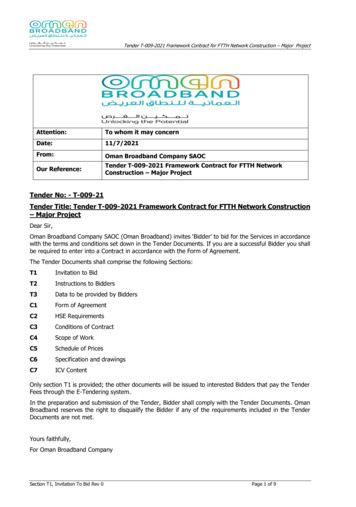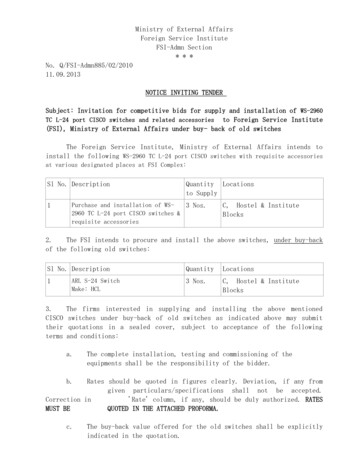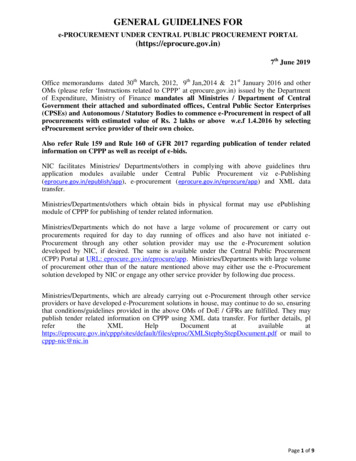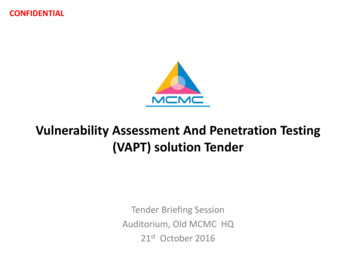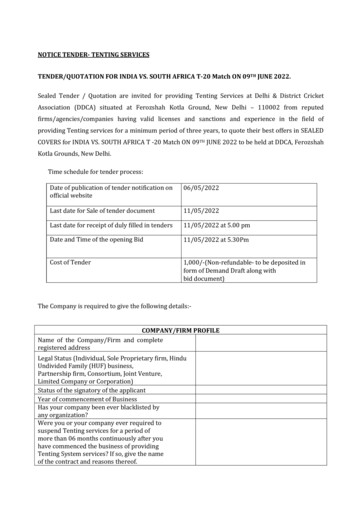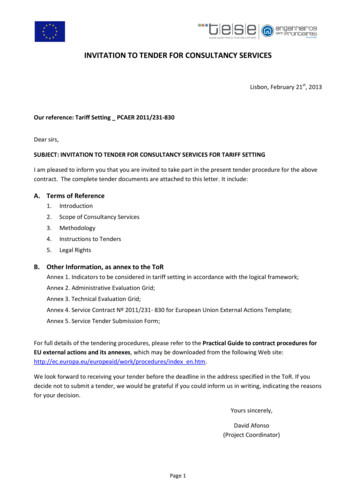
Transcription
INVITATION TO TENDER FOR CONSULTANCY SERVICESLisbon, February 21st, 2013Our reference: Tariff Setting PCAER 2011/231-830Dear sirs,SUBJECT: INVITATION TO TENDER FOR CONSULTANCY SERVICES FOR TARIFF SETTINGI am pleased to inform you that you are invited to take part in the present tender procedure for the abovecontract. The complete tender documents are attached to this letter. It include:A. Terms of Reference1.Introduction2.Scope of Consultancy Services3.Methodology4.Instructions to Tenders5.Legal RightsB. Other Information, as annex to the ToRAnnex 1. Indicators to be considered in tariff setting in accordance with the logical framework;Annex 2. Administrative Evaluation Grid;Annex 3. Technical Evaluation Grid;Annex 4. Service Contract Nº 2011/231- 830 for European Union External Actions Template;Annex 5. Service Tender Submission Form;For full details of the tendering procedures, please refer to the Practical Guide to contract procedures forEU external actions and its annexes, which may be downloaded from the following Web /index en.htm.We look forward to receiving your tender before the deadline in the address specified in the ToR. If youdecide not to submit a tender, we would be grateful if you could inform us in writing, indicating the reasonsfor your decision.Yours sincerely,David Afonso(Project Coordinator)Page 1
Terms of Reference for Consultancy Services for Tariff SettingBambadinca Sta Claro –Community Programme for Access to Renewable EnergyDate: 05/03/20131Consultant Qualifications and Experience . 12Language. 12Expected Dates . 13Clarifications on these ToR . 13Proposal Submission. 13Evaluation and Selection Criteria . 14Applicable Conditions . 14Legal Rights .145.16Methodology: Tasks to Integrate . 7Consultancy Outputs . 7Action Plan . 11Budget . 11Instructions to Tenders .124.14.24.34.44.54.64.75Objective. 5Terms and Overall Conditions . 5Methodology. 63.13.23.33.44Background of Bambadinca Sta Claro . 4Scope of Consultancy Services . 52.12.23Version: 4.5Introduction . 31.12Developed by: TESE-EWBIntellectual Property Rights . 15Documents Annexed .15These ToR have been prepared and approved by TESE – Development Association.Page 2
Terms of Reference for Consultancy Services for Tariff SettingBambadinca Sta Claro –Community Programme for Access to Renewable EnergyDate: 05/03/2013Developed by: TESE-EWBVersion: 4.51 IntroductionTESE – Development Association is a Portuguese Non-Governmental Development Organization (NGDO)established in 2002, which aims to create and implement innovative solutions to advance socialdevelopment, equality of opportunities and wellbeing. In order to achieve its goals, TESE adopts a positiveapproach, finding in social need an opportunity to act and to promote partnerships between the public,private and third sectors.Engineers Without Borders (EWB) is the international unit of TESE (TESE-EWB). We focus our interventionon Environment and Development issues, promoting social entrepreneurship and sustainable access toservices and social infrastructures within the Water, Sanitation, Energy and Waste sectors.TESE-EWB aims to enhance sustainable human development by improving access to services and socialinfrastructures, particularly in underserved communities, concurring to the achievement of the MillenniumDevelopment Goals (MDGs).Bambadinca Sta Claro – Community Programme for Access to Renewable Energy, contract nº2011/231830, has as specific objective ensure sustainable access to electricity through renewable energy to thevillage of Bambadinca, Bafatá Region, in Guinea-Bissau.Expected results of the project:R1. Management model of the community energy central created and implemented through aparticipatory approach and a focus on its sustainability;R2. Bambadinca population made aware of safety procedures and energy efficiency;R3. Bambadinca population with access to affordable electricity through the Decentralized System ofElectricity Production and Distribution, from Renewable Energy source.Duration: 42 months, from October 2011 to March 2015.Budget for the action: 2.140.724 EUR, co-funded by the European Union (ACP-EU Energy Facility, 75%) andby the Portuguese Cooperation Agency (25%).Direct beneficiaries: 1.000 households (around 6.500 inhabitants) of Bambadinca village, 84 existing microenterprises and 16 institutions.Page 3
Terms of Reference for Consultancy Services for Tariff SettingBambadinca Sta Claro –Community Programme for Access to Renewable EnergyDate: 05/03/2013Developed by: TESE-EWBVersion: 4.51.1 Background of Bambadinca Sta ClaroGuinea Bissau is one of the poorest countries of West Africa. In accordance with the household surveyconducted by TESE-EWB (ESCE1), poverty rate2 in Bambadinca was estimated in 99,73%, being higher thanthe national average. This conclusion is in line with data from DENARP II3, regarding poverty incidence inBafatá region (which includes Bambadinca).Guinea Bissau’ government set as goals, in DENARP II, to promote: i) renewable energy sources as means ofreducing dependence on petroleum products; and, ii) access to modern energy services in rural and semiurban areas.Map 1 Bambadinca location (Google, 2009)According to ESCE, about 95% of Bambadinca population does not have access to any source of electricity.Micro-commerce is also affected by this situation, from which only 20% has access to electricity. The studyconducted by TESE-EWB evidenced that the main sources of energy used to replace electricity, by thepopulation, are candles (96.27%) and batteries (98.60%) (ESCE, 2009).The total weight of expenditure on energy, in household’ income, ranges between 18.84% and 72.63%,being higher in lower income groups. The one that most contributes to the financial burden of thehousehold is expenditure on electricity or substitutes (24%, on average). This is estimated to be higher thanthe actual expense they would incur, if using electricity (based on the tabulated price for electricity in ruralareas).With Bambadinca Sta Claro project, a PV-Hybrid Power Plant will be constructed and encompass 3 (three)Power Generation Groups. Former distribution lines will be rehabilitated and expanded guaranteeingaccess to energy by inhabitants of Bambadinca village. Future clients of the energy service include1Socioeconomic and Energy Consumption Characterization Study (TESE-EWB, 2010).Given the international standard of 2USD per capita/day.3Poverty Reduction Strategic Paper – Guinea-Bissau, 2011-2015 (IMF, 2010).2Page 4
Terms of Reference for Consultancy Services for Tariff SettingBambadinca Sta Claro –Community Programme for Access to Renewable EnergyDate: 05/03/2013Developed by: TESE-EWBVersion: 4.5households (with specific energy consumption patterns and differents capacity to pay), small businessesand local institutions.The table below summarizes a set of indicators4 referring to the PV-Hybrid Power Plant by the end ofproject implementation.PV Installed Power (kW)Diesel Installed Power (kW)Estimated Annual Energy Yield (kWh)Performance RatioPeak Power Consumption (kW)Nominal Power Consumption (kW)Estimated Daily5 Energy consumption (kWh)624240899.0000,73164,00751.179,06Payment will be made through prepaid meters6, which clients will rent to ACDB - Community Associationfor the Development of the Bambadinca’ sector. The option for renting intends to lower connection feesand allows to impose measures for removal of the meter to another house, in such cases customers do notmake use of the energy system for a set period.A tri-party management model is being established guaranteeing that procedures and competencies arewell defined in four dimensions: i) financial and commercial management; ii) system operation andmaintenance; iii) system surveillance and security; and, iv) prevention and conflict resolution. ACDB will bethe main responsible for management of the system, but will work in cooperation with thenational/regional energy authority and local community leaders.2 Scope of Consultancy Services2.1 ObjectiveDevelop the tariff proposal and a set of complementary tools to be implemented in the energy service ofBambadinca, in close coordination with the project team and given the principles participativelyestablished with community representatives.2.2 Terms and Overall ConditionsThe tariff proposal study must take into consideration the project overall and specific objective, as well asproject expect results7.4All values are subject to change, as TESE is currently negotiating the work and supplies contract award for theconstruction of the PV-Hybrid Power Plant. This process is expected to finish in March 2013.5For an average day in August, the lowest radiation energy yield month.6First meters will be acquired by the project. The specific number of meters is yet to establish following the contractaward for rehabilitation and expansion of the distribution lines.7See annex 1 for a list of indicators, taken from the project’s logical framework, to be considered in tariff setting.Page 5
Terms of Reference for Consultancy Services for Tariff SettingBambadinca Sta Claro –Community Programme for Access to Renewable EnergyDate: 05/03/2013Developed by: TESE-EWBVersion: 4.5On developing the tariff setting proposal, the consultant must consider the principles defined through aparticipatory approach with the project beneficiaries, target group representatives, local authorities andother relevant key informants. These principles are as follow: Good governance: the proposed tariff must be guided by transparency and clear definition of the coststructure and operating margin;Financial sustainability: the suggested tariff must guarantee cost recovery (100%) from activities relatedto management, operation and maintenance (O&M) of the PV-Diesel Power Plant and of thedistribution mini-grid8.Distributive justice and universal access: the advocated tariff must ensure the opportunity to access tothe energy service by all beneficiaries regardless of the differences in income and energy consumptionassociated to different groups;Economic efficiency: the tariff must pursue economic efficiency, regarding short and long termequilibrium, while taking into account the national legislated tariff and avoid market distortions.Furthermore, the study must be guided by a Life Cycle Approach (LCA), considering a 10 year life span ofthe energy service and the tariff has to ensure that expenditure on energy reflects consumption (consumerpay approach). This will apply to all consumers except religious institutions9, due to deliberation of project’beneficiaries.The consultancy services must be implemented in close coordination with the project team. TESE-EWB willdesignate a focal point that will centralize all communication among the consultant, TESE-EWB, thebeneficiaries and local authorities (during the consultancy's implementation length). Furthermore, it isexpected that the focal point is actively involved in the carried study. Thus, in the technical proposal theconsultant has to propose the activities and tasks to be implemented by the focal point and/or with hissupport. Activities and tasks to be implemented by (or with the support of) the focal point will be set indetail between the consultant and the project coordination, during the contract award negotiation.3 MethodologyThe consultant must present a detailed methodology for implementation of the above tariff setting studies,based on state of the art methodologies, common constraints in access to energy in developing countries &off grid electrification and Guinea-Bissau’s reality.Notwithstand, a set of tasks must be included in the global envisaged methodology. These are presentedbelow, in section 3.1. Methodology: Tasks to integrate.8Among others, OPEX has to reflect annual replacements of equipments with life span inferior to 10 years (asbatteries, charge regulators or invertors). Management costs must be presented apart from OPEX, and includetraining and technical assistances to strengthen management and technical capacities along the 10 years of operation.It is expected that the consultant presents through a graphic (or other visual approach) an evolution, throughout thelife cycle of the PV-Diesel Power Plant, of the relative weights of CAPEX, OPEX and Management costs.9Extendable up to a consumption-cap to be determined given current energy consumption.Page 6
Terms of Reference for Consultancy Services for Tariff SettingBambadinca Sta Claro –Community Programme for Access to Renewable EnergyDate: 05/03/2013Developed by: TESE-EWBVersion: 4.53.1 Methodology: Tasks to IntegrateTaskDescriptionObservations1Benchmark onElectricity and off-gridtariffsWithin the consultancy implementation, the consultant will have todevelop a benchmark on electricity and off-grid tariffs to sustain a setof important decisions to be made linked with tariff setting10.2Assumption definitionTESE-EWB is responsible for providing information regarding: i) Powerplant architecture & mini grid and general functioning of the energysystem and capital costs; ii) Energy production; iii) Load curve, bydifferent consumer type; iv) Detailed management and OPEX costs; v)Expected connection rates, by year of operation.At the end of this task, consultant must be able to present a frameworkintegrating all assumptions, guaranteeing that these will be reflected intariff setting.Assumption definition must also take into account impacts resulting ofchoices made, including impact on access by future customers (namely,taking into account behavioral economics).3Development ofdifferent cost recoveryscenarios and sensitivityanalysis of selectedvariablesAs a pilot project, variations on assumptions and main variables mustbe considered and their impact analysed. Among others, it ismandatory to include a stress test of high and low case risks scenariosand repayment ability.Though not mandatory, the consultant is expected to presentcalculations in a monthly basis until the breakeven point, followingwhich these can be presented annually.Conclusions from this task may lead to adjustments in the developedmodels.4Workshop: Presentationof main findings torelevant stakeholdersA meeting hosted in Guinea-Bissau to present the study to: nationaland local energy authorities, beneficiaries, partners, project fundingagencies and other relevant key informants.Suggestions from this meeting may lead to adjustments in the finalreport.3.2 Consultancy OutputsThe consultancy will have 3 (three) deliverable (D) outputs :DDescriptionD1Benchmark on Electricity and off-grid tariffs (Draft and Final version)D2Report on Tariff Setting (Draft and Final version)10The benchmark must allow to present answers to questions like the following: i) Should the EAGB – Energy and10Water Public Company tariff scheme be adopted?; ii) Should price be differentiated by types of consumers?; iii) Arethere limitations in previous off-grid services that should be integrated in the price structure?; and, iv) What are theconstraints imposed by pre-paid meters?Page 7
Terms of Reference for Consultancy Services for Tariff SettingBambadinca Sta Claro –Community Programme for Access to Renewable EnergyDate: 05/03/2013Developed by: TESE-EWBVersion: 4.5D3Tariff Setting Model and Operation Manual (Draft and Final version)D4Workshop Presentation, Proceedings and all other Documentation Produced (Draft and Finalversion)All deliverables must be developed by the consultant and not by others.A draft version of all deliverables must be presented to TESE-EWB to analysis and discussion, which maylead to adjustments to be included in the final versions. The draft and final deliverables must be submittedas presented in these ToR.All the draft and final deliverables must be properly formatted and edited. The final deliverables, includingall annexes, must be presented in electronic format and in two (2) hardcopies. In the electronic format alldocuments must be presented in a closed format (as an example,*.pdf) and in an editable format (as anexample,*.docx/*.xlsx/*.pptx).The final deliverables shall be submitted no later than the end date of the contract (further information onexpected dates is presented in section 4.3).D1: Benchmark on Electricity and off-grid tariffsThe benchmark shall be guided by a review of tariff setting principles & models (textbook) and case studies,but must be bounded to Guinea-Bissau’s reality. Thus, the analysis shall not be general and disregardingGuinea-Bissau’s specific situation11.For this reason, and regarding exclusively this deliverable, a structure of the benchmark must be sent toTESE-EWB to discussion, prior to completion to guarantee that an holistic approach is incorporated intothe analysis.Among others, rates to be analysed in the benchmark include: i) Flat/Linear rates; ii) Decreasing/increasingblock rates; iii) rates per type of consumer; iv) rates pegged to contracted power; v) rates pegged topeak/off peak consumption.The benchmark structure must cover:a. Eco-Fin indicators, including analysis on price structures and implications on connection fee and oncost-recovery;b. Social indicators, including impact on low-income clients, capacity & willingness to pay for tariff andfor connection fee, and complexity regarding customers' ability to understand the tariff structure.c. Technical indicators, given the PV-Hybrid Power Plant architecture and implications to prepaidmeters;d. Environmental indicators, relating to incentives for energy efficiency.11Refer to section 1.1 Background of Bambadinca Sta Claro.Page 8
Terms of Reference for Consultancy Services for Tariff SettingBambadinca Sta Claro –Community Programme for Access to Renewable EnergyDate: 05/03/2013Developed by: TESE-EWBVersion: 4.5The benchmark shall be develop with support of TESE-EWB12 and trigger a discussion between TESE-EWBand the consultant in order to validate decisions and how to best integrate these in the following phases ofthe consultancy.D2: Report on Tariff SettingA preliminary report structure is presented below, identifying sections to include in the report to bepresented to TESE-EWB. Consultant are welcome to comment on this structure and include other relevantsections, upon justification in the technical proposal for his options.SectionObservations1. Executive summary2. IntroductionMust describe the context and the project. Moreover, the frameworkthat guides the consultancy should be made clear in this section, namelythe objective and scope.3. MethodologyMust clearly established the methodology implemented and sustain thechoice for implementing such methodology in comparison with others.4. Desk review and secondarydata analysisMust synthesize main findings and implications to the consultancy beingcarried.5. Assumptions presentationMust clearly present all the assumptions and justify each of them,ranging from macro level (as inflation) to micro level (as connectionrate).6. Costumer groups and loadprofileMust take as baseline, data from ESEC regarding: i) consumerconsumption; ii) consumer expenditure; and, iii) load curve.7. Development of the costmodelMust evidence different costs and their weight in the final expected cost.It is expected that the consultant presents a cost breakdown along theenergy service lifespan.8. Development of the ratesetting modelMust evidence price structure, connection fees, possible variationsamong different consumer groups and penalty regime13.It is expected that the consultant presents a breakdown of the rate alongthe energy service lifespan.9. Economical and financialanalysisMust include cost recovery scenarios and sensitivity analysis of selectedvariables.Also, this section must link with project indicators presented in Annex 1of the ToR.10. Social analysisMust focus on access by different consumer groups and behavioralchoices.12This participation must enable integration of knowledge of local constraints and know behavior from consumers andpractices from other energy services existing in Guinea-Bissau.13For example, measures for removal of the meter between house/clients, in case customers do not make use of theenergy system for a set period.Page 9
Terms of Reference for Consultancy Services for Tariff SettingBambadinca Sta Claro –Community Programme for Access to Renewable EnergyDate: 05/03/2013Developed by: TESE-EWBVersion: 4.5Also, this section must link with project indicators presented in Annex 1of the ToR.11. ConclusionMust follow from evidence found in the consultancy implemented, butbe clearly distinct.D3: Tariff Setting Model and Operation ManualA tariff setting model structure proposal is presented below. It is important to note that the OperationManual refers to the Model, but should be presented in separate. Consultant are welcome to comment onthis structure and include other relevant sections, upon justification in the technical proposal for hisoptions.SectionObservations1. Spreadsheet: SummaryMust synthesise the main variables and outputs for the most importantanalysis.2. Spreadsheet: AssumptionsMust include all assumptions presented in the Tariff Setting Report.3. Spreadsheet: Cost modelsettingMust be user friendly and intuitive ensuring that in the future, localinstitutions are able to alter and update costs and assumptions (ifnecessary).4. Spreadsheet: Rate settingmodelMust be user friendly and intuitive ensuring that in the future localinstitutions are able to analyze results and inculcate long termalterations on tariff.5. Spreadsheet: Sensitivityanalysis and stress testMust include all performed calculations presented in the Tariff SettingReport.6. Operational manualMust clearly express the correct procedures to alter all the spreadsheets,facilitating understanding by local users.Should be self explanatory.D4: Workshop Presentation, Proceedings and all other Documentation producedThe workshop must be implemented, in Guinea-Bissau, by the consultant and not by others.TESE-EWB local team will support the consultant in the logistics of Workshop preparation. Facilitation ofthe Workshop may be assisted by TESE-EWB focal point, in order to restrain languages limitations.The workshop must include: Presentation of main findings and implications for access to energy in Bambadinca;Possibility of extrapolation of the Bambadinca Energy Service case-study to rural electrification inGuinea-Bissau;Discussion moment enabling questions and answers with the participants;Moment of validation for voting and approval of the tariff setting proposal and/or of alternativesidentified during the workshop.Page 10
Terms of Reference for Consultancy Services for Tariff SettingBambadinca Sta Claro –Community Programme for Access to Renewable EnergyDate: 05/03/2013Developed by: TESE-EWBVersion: 4.5The draft presentation must be sent to TESE-EWB, 15 days before implementation of the workshop.Workshop final presentation, minutes and any other documents produced during the workshop must besent to TESE-EWB up to 15 (fifteen) days after the implementation (further information on expected datesis presented in section 4.3).3.3 Action PlanAll consultants must present an action plan following the template presented below.#ActivityW1MonthW2 W3W4.Level of effort(days)A1A2A3 As referred before, the action plan must clearly indicate participation of TESE-EWB’s focal point.Furthermore, discussion moments between the consultant and the focal point must be made clear.3.4 BudgetBudget: Maximum 25.450 EUR. This figure encompass the cost of a field mission to Guinea-Bissau, includingflight14 and per diems. The length of the field mission should vary between a minimum of 7 and a maximumof 14 days.All consultants must submit a financial proposal following the template presented below.Budget LineUnitUnit CostTotalConsultant #1 FeeConsultant #2 Fee (if applicable)Flight to Guinea-BissauPer diemReport production and related overheadsSubtotalValue added tax or other taxes (XX%, if applicable)Total14Though included in the price, the consultant will have to present to TESE-EWB the flight receipt and boarding pass,to audit purposes.Page 11
Terms of Reference for Consultancy Services for Tariff SettingBambadinca Sta Claro –Community Programme for Access to Renewable EnergyDate: 05/03/2013Developed by: TESE-EWBVersion: 4.5The budget must refer to all costs, including taxes if applicable. All costs related to bid preparation andsubmission will be borne by the consultant.4 Instructions to Tenders4.1 Consultant Qualifications and Experience Proposals are accepted by individual or corporate consultants;Key experts must have a Masters Degree or Doctorate in Economics, Finance, Engineering or BusinessAdministration;Knowledge of behavioral economics is an advantage;At least 5 years experience in establishing rate setting models in the energy sector, with preference forexperience in the renewable off-grid PV-Hybrid Power Plants;Experience in provision of consultancy services in ACP Countries required and experience in the WestAfrica sub-region valued;Available throughout the whole consultancy service period and to regularly engage in skype meetingswith TESE-EWB’s focal point;Proven ability in clear report writing and development of operational manuals;Proven competence in facilitation workshops and in engaging with different audiences;Fully fluent in English and French is a requisite while Portuguese language knowledge is valued;Good communication skills required;Ability to effectively manage time and resources available and meet deadlines;The consultancy work may not be re-assigned by the consultant.4.2 LanguageConsultant must present the expected deliverables in Portuguese. If Portuguese is not the mother-tongueof the consultant, deliverables may be presented in Portuguese and in English.An exception to this concerns the Workshop, which may be facilitated in Portuguese or French (includingworkshop deliverables).Likewise, proposal submissions can be presented in Portuguese or in EnglishPage 12
Terms of Reference for Consultancy Services for Tariff SettingBambadinca Sta Claro –Community Programme for Access to Renewable EnergyDate: 05/03/2013Developed by: TESE-EWBVersion: 4.54.3 Expected DatesDescriptionDeliverableCommencement date (expected)Benchmark on Electricity and off-grid tariffsReport on Tariff SettingTariff Setting Model and Operation ManualWorkshop ImplementationWorkshop Presentation, Proceedings and all otherDocumentation producedFinal date (expected)D116D2D3D4Expected Date15DraftFinalApril 15thMay 17thMay 31stAugust 5thSeptember 16thAugust 5thSeptember 16thSeptember 2ndAugust 19thSeptember 16thSeptember 16th4.4 Clarifications on these ToRClarifications on these ToR may be submitted by email, to s.dourado@tese.org.pt and cc tod.afonso@tese.org.pt , until March 8th 2013.TESE-EWB will respond to all questions up to March 11th 2013.4.5 Proposal SubmissionApplications must be submitted until 12.00 hours, March 18th, 2013 to s.dourado@tese.org.pt and cc tod.afonso@tese.org.pt . Applications are accepted in Portuguese or in EnglishThe application must be as detailed as possible and provide complete information about the consultant (orconsultants team), previous experience and methodology.The consultant must submit in separate:A. Service Tender Submission Form, using the template provided in Annex 5;B. Technical pro
the energy service and the tariff has to ensure that expenditure on energy reflects consumption (consumer pay approach). This will apply to all consumers except religious institutions9, due to deliberation of project' beneficiaries. The consultancy services must be implemented in close coordination with the project team. TESE-EWB will

